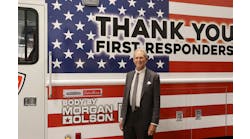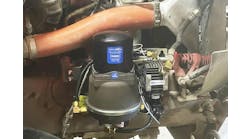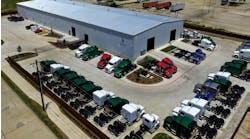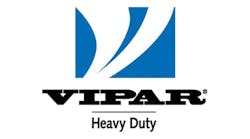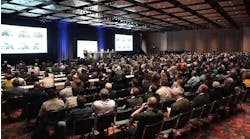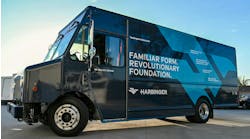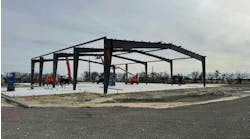Trux Super Store: A love of truck accessories becomes a booming upfit business
People in the food service industry are quick to caution: Just because you like to eat doesn’t mean you should open a restaurant. Chad Fitzgerald can relate, although his passion has long been truck accessories (and modified dirt track racing) rather than veal scallopini. So in 2003 he sold several small businesses he owned and launched the Trux Super Store in Houston. Brother Ryan Fitzgerald later became a co-owner, after arm troubles put an end to his professional baseball career.
The Fitzgeralds soon learned, however, that the truck accessories business wasn’t all chrome and games.
“When we first started it was real rough,” Chad says. “It was hard to control the finances because we let our inventory get out of control. A lot of distributors set up charge accounts for us, and we ended up getting behind on money. And when you get behind the eight ball, it’s hard to recover.
“But you know your mistakes when you make them. It’s just learning from those mistakes. We grinded it out. It was a very, very intense couple of years.”
Spoiler alert: Chad is being interviewed in his large office in a handsome new 25,000-square-foot facility on Interstate 10 in Baytown, just east of Houston—so the company did recover, and has since prospered. Indeed, Ryan wasn’t available because he was finalizing a deal to buy another location.
The lessons learned include “not thinning ourselves out” and managing cash flow, he explains. That meant periods when the bills got paid and the owners didn’t.
“Now we have a certain buffer of funds and that number stays there all the time. You don’t want to put yourself in a bind. It took us a while to get the hang of that,” he says. “We don’t charge any of our inventory; we don’t charge anything—everything’s paid in full. That’s the key to it: The money we have in the bank is the money we have in the bank.
“Businesses go under because the owners see themselves making a little bit of money and then pull from the business too early. They don’t have the running money to last.”
More significant to sustaining the growth of the company, the Fitzgeralds discovered the upside potential of commercial truck upfitting.
In a local market dominated by a single, large truck body company with other smaller upfitters scrambling for a place, Trux Super Store found an edge in being “the new kid on the block.” Specifically, when the market leader has a backlog of nine months, success on the commercial side has meant having inventory on hand.
“By having a customer that comes in and we have something in stock, and then being able to put it on immediately—that gets our foot in the door,” he says. “Now we know which client needs what and how much volume they use, and we keep a lot of it in stock.”
Consequently, it’s also important to be aware of supplier lead times and maintain those inventory levels, he adds.
For example, Trux Super Store—which specializes in vehicles for the oil and gas industry—keeps about 80 truck beds in stock “at all times,” as well as cranes and other equipment. “That’s our niche: If a customer is asking for it, that means they’ve got an employee on the other end waiting for it,” he says.
On the retail side, because of the wide variety of pickup makes and models, the showroom is exactly that: Customers place orders for the exact part they need through the store. But that leaves the retail parts business open to competition from e-commerce sites.
“Amazon’s probably our worst enemy,” Chad says. “They sell it for 5% more than we can buy it for. The big trend we’re seeing is a lot of people are buying their stuff online then wanting to bring it in to us to have it installed. We do it on a case-by-case basis: If you purchase from us, there’s a certain hourly shop rate; if you walk in with it, there’s a different rate. So we end up making quite a bit back on the margin. It is what is—that’s just the way everything is going.”
The facility
Opened last summer, the store has a 2,000-square-foot showroom, while the shop features 24 bays, divided between the retail and commercial installation areas.
Designed by Ryan and Chad, the bright and colorful showroom features extensive use of graphics conveying the Trux brand and Lone Star roots. A closer look reveals unusual but appropriate automotive-related fixtures and furnishings, such as a coffee table resting on an engine block and a restroom vanity built from a mechanic’s toolbox.
The new location’s visibility to I-10 traffic already has resulted in “a lot” of new fleet accounts.
“There’s really no one on this side of town,” he says. “There’s a lot of refineries, and we ship vehicles all over the nation. And our No. 1 client, a pipeline company, is here in Baytown, so we did it for convenience for them as well.”
The Baytown location replaces a shop in Houston, and will continue to handle the larger equipment. The original Trux Super Store in North Houston continues to serve the light-duty truck market.
The business
Trux Super Store upfits 200 to 300 service bodies a year, and the commercial side of the business now accounts for about 80% of revenue.
The company also recently bought an existing truck equipment business in Beaumont, about an hour east.
“It’s kind of an untapped market. There’s one person in business there, and he’s been there for about 50 years,” Chad says. The Beaumont location will be called Trux Service Body and Rigging.
Trux Super Store currently has 41 employees and plans to add another 15 or 20 in Beaumont.
As for recruiting and retaining installers, Chad says he could always use four or five more. Posting jobs through Facebook, targeted to the right location and demographic, has proved successful, he notes. He’s also observed that good installers view their work as a craft, and tend to stay in the industry. In his shop, fabricators and installers have developed specialties and each fills a role.
Having just returned from the Work Truck Show, the company made a deal with an aluminum body supplier to meet the “real hot” demand for reducing vehicle weight. The first body will be tested for ruggedness by a customer who uses equipment in “the roughest terrain you’ve ever seen.”
“They have a lifetime warranty, and they stand behind their product, so we’ll see,” he says.
More broadly, Trux Super Store is looking for “competitive lines” from vendors who believe in maintaining a relationship.
“We make sure that we focus a lot of our purchasing power where there is loyalty, that we are a big fish for them to lose,” he says. “Especially for the commercial side, it has to be a superior product; it can’t be something we have to warranty. We might pay a little more, but that’s to cut down on warranty work. Our No. 1 focus is customer service.”
Indeed, Chad tells of putting an installer on a plane to remedy a mistake; the work took less than an hour.
“I don‘t mind giving them that type of service, because the bigger companies won’t,” he says. “Those little things just make the difference. It shows customers that you appreciate their dollars. That’s also important on the retail end, instead of just taking their money, doing the install, and ‘see you later.’”
Trux Super Store also uses Facebook for product advertising.
“You can really focus on your demographic,” he says. “You can concentrate on what you’re wanting to do.”
For the commercial side of the business, the focus is now on handling the current roster of customers.
“We do pick up some new clients, but we aren’t out there trying to get too big,” Chad says. “We don’t want to get a good client and then not be able to deliver, or have to sacrifice somewhere else.”
The Fitzgeralds are both in their mid-40s, but so far only the Chad’s son Harrison, now 17—the oldest in the next generation—has expressed an interest in the family business. After spending last summer “pushing a broom” as a shop helper, he’ll be assigned to “the back pocket” of an installer as he heads into his senior year of high school.
Chad wants Harrison to have complete understanding the way the store works before he goes to college, where he plans to study business—and maybe, when Harrison’s turn comes to lead Trux Super Store, he won’t have as much to learn the hard way.
